Nurses Narratives Staff Nurse Annie C Cameron
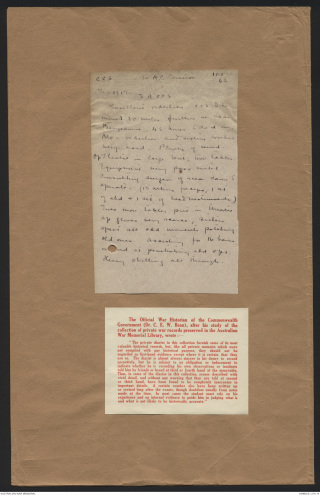
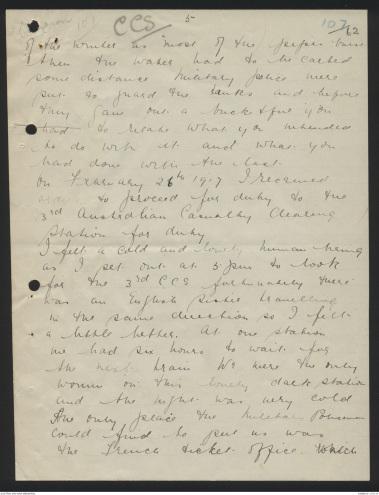
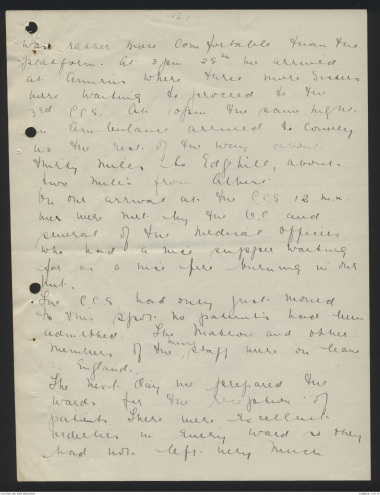

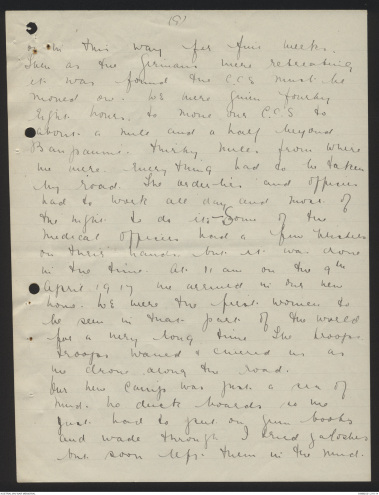
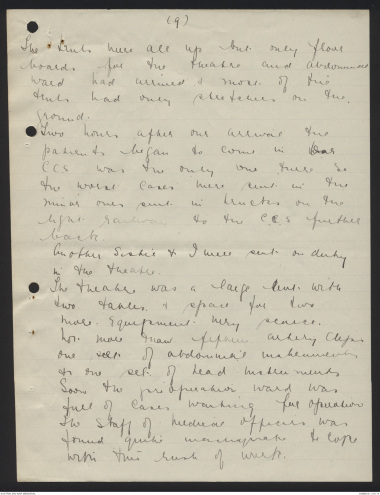
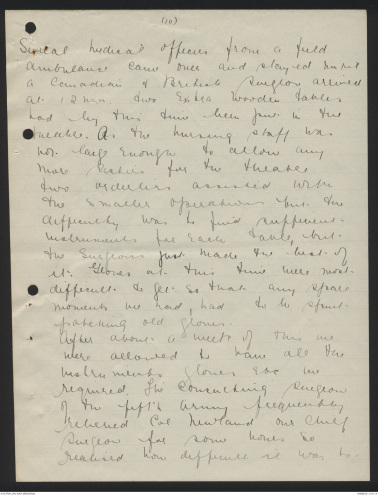
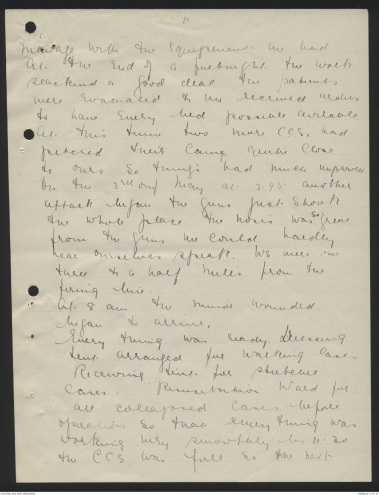

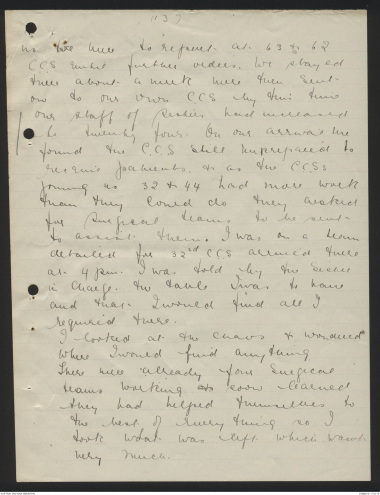
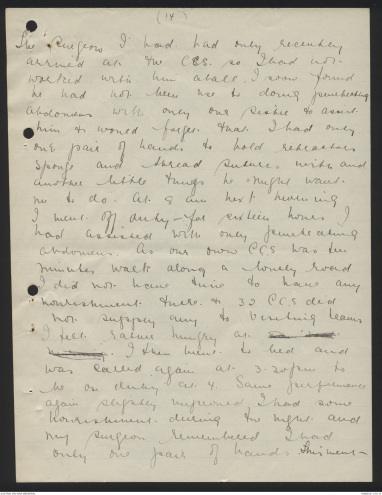
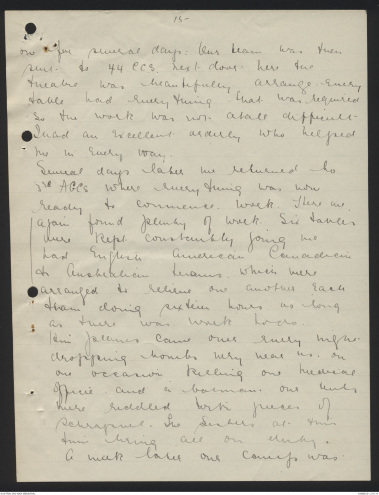
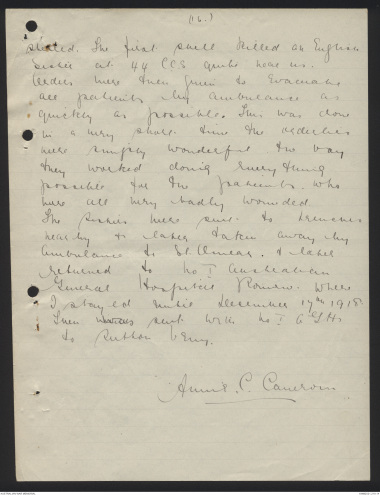
CCS Sr A. C. Cameron 107 62
1917
3 H. C.C.S.
Everything [[adectates ext?]] to be
moved 20 miles further on near
[[Baupemaine?]], 48 hours to do it in.
ME in [[Mastion?]] and Sisters [[working]]
very hard. Plenty of wound.
Op Theatre in large [[base?]], [[two doctors?]]
Equipment very poor [[needed]]
Commanding Surgeon of area came to
operate. (15 artery forceps, 1 set
of abd + 1 set of head instruments)
Two more tables put in theatre
op gloves very scarce, sisters
spent all odd moments patching
old ones. Assisting for the basic
[[wound?]] as puncturing abd organs.
Heavy [[shelling?]] all through.
The Official War Historian of the Commonwealth
Government (Dr. C. E. W. Bean), after his study of the
collection of private war records preserved in the Australian
War Memorial Library, wrote:-
"The private diaries in this collection furnish some of its most
valuable historical records, but, like all private memoirs which were
not compiled with any historical purpose, they should not be
regarded as first-hand evidence except where it is certain that they
are so. The diarist is almost always sincere in his desire to record
accurately, but he is subject to no obligation or inducement to
indicate whether he is recording his own observations or incidents
told him by friends or heard at third or fourth hand at the mess-table.
Thus, in some of the diaries in this collection, scenes described with
vivid detail, and without any warning that they are told at second
or third hand, have been found to be completely inaccurate in
important details. A certain number also have been written up
or revised long after the events, though doubtless usually from notes
made at the time. In most cases the student must rely on his
experience and on internal evidence to guide him in judging what is
and what is not likely to be historically accurate".
CCS 5- 107/62
of the winter as most of the pipes burst
then the water had to be carted
some distance Military police were
put to guard the tanks and before
they gave out a bucketful you
had to relate what you intended
to do with it and what you
had done with the last.
On February, 26th 1917 I received
orders to proceed for duty to the
3rd Australian Casualty Clearing
Station for duty
I felt a cold and lonely human being
as I set out at 3 pm to look
for the 3rd C.C.S fortunately there
was an English Sister travelling
in the same direction so I felt
a little better. At our station
we had six hours to wait for
the next train We were the only
women on this lonely dark station
and the night was very cold
The only place the Military Policeman
could find to put us was
the French ticket office. Which
[6]
was rather more comfortable than the
platform. At 3pm 28th we arrived
at Amiens where three more Sisters
were waiting to proceed to the
3rd C.C.S At 10pm the same night,
an Ambulance arrived to convey
us the rest of the way about
thirty miles to Edgehill, about
two miles from Albert
On our arrival at the C.C.S 12m.n.
we were met by the G.C and
several of the Medical Officers
who had a nice supper waiting
for us a nice fire burning in our
hut.
The C.C.S had only just moved
to this spot no patients had been
admitted. The Matron and other
members of the nursing staff were on leave
in England.
The next day we prepared the
wards for the reception of
patients. There were excellent
orderlies in every ward so they
had not left very much
7
for us to do. Quite close to us
were 45 CCS and 5.6 (C.C.S are generally
put in groups of three) In this
group 45 CCS received for 24 hours
or until they had three hundred
patients then 5.6 did the same
then it was the 3rd GCCs receiving
day. On the night of the 1st march
it was the 3rd ACCs receiving
day so we soon found we had
plenty to keep us busy
Our staff was Sister in Charge and
six sisters but at this time
Sister O'Dwyer with two other sisters
had not arrived from England
so we had to carry on as we
were after the first twenty
four hours one Sister collapsed
& had to go to bed then
there were three. The next day
the others arrived from England
so things were more easily
managed.
A week later our staff was
increased to ten. We went
(8)
on in this way for five weeks.
Then as the Germans were retreating
it was found the C.CS must be
moved on. We were given fourty
eight hours to move our C.C.S to
about a mile and a half beyond
Baupaume. thirty miles from where
we were. Every thing had to be taken
by road. The orderlies and officers
had to work all day and most of
the night to do it. Some of the
Medical Officers had a few blisters
on their hands but it was done
in the time. At 11am on the 9th
April 1917 we arrived in our new
home. We were the first women to
be seen in that part of the world
for a very long time The troops
troops waved & cheered us as
we drove along the road.
Our new camp was just a sea of
mud. No duck boards so we
just had to put on gum boots
and wade through. I tried galoshes
but soon left them in the mud.
(9)
The huts were all up but only floor
boards for the theatre and abdominal
ward had arrived & more of the
huts had only stretchers on the
ground.
Two hours after our arrival the
patients began to come in Our
CC.S was the only one there so
the worst cases were sent in the
minor ones sent in the trucks on the
light railway to the C.C.S further
back.
Another Sister and I were sent on duty
in the theatre.
The theatre was a large tent with
two tables & space for two
more. Equipment very scarce.
Not more than fifteen artery clips
one set of abdominal instruments
& one set of head instruments
Soon the perioperation ward was
full of cases waiting for operations
the staff of Medical Officers was
found quite inadequate to cope
with this rush of work.
[10]
Several medical officers from a field
ambulance came over and stayed until
a Canadian & British Surgeon arrived
at 12mn. Two extra wooden tables
had by this time been put in the
theatre. As the nursing staff was
not large enough to allow any
more Sisters for the theatre
two orderlies assisted with
the smaller operations but the
difficulty was to find sufficient
instruments for each table, but
the Surgeons just made the best of
it. Gloves at this time were most
difficult to get so that any spare
moments we had, had to be spent
patching old gloves.
After about a week of this we
were allowed to have all the
instruments gloves etc we
required. The Consulting surgeon
of the fifth Army frequently
relieved Col Newland our Chief
Surgeon for some hours so
realised how difficult it was to
11
manage with the equipment we had
At the end of a fortnight. the work
slackened a good deal the patients
were evacuated & we received orders
to have every bed possible available
At this time two more C.C.S. had
pitched their camp quite close
to ours so thing's had much improved
On the 3rd [[of?]] May at 3.45 another
attack began the guns just shook
the whole place the noise was so great
from the guns we could hardly
hear ourselves speak. We were only
three & a half miles from the
firing line.
At 8am the minor wounded
began to arrive.
Every thing was ready. Dressing
tent arranged for walking cases
Receiving tent for stretcher
Cases. Resuscitation Ward for
all collapsed cases before
operation so that every thing was
working very smoothly by 11.20
the CCS was full so the next
12
C.CS had to receive. Several hours
later an Ambulance train arrived
which took away the minor which cases could which did wait for operations. not need operations. So we went on
from day to day until the battle
was over.
The only patients we received at this
time were Australians. Such a cheerful
lot of boys I have never seen With
the most dreadful wounds they scarcely
murmured. Thankful for every little
thing that was done for them & each
one thinking the others were much
worse than he was.
In July we received orders to close
the C.C.S and move north. So every
thing was packed and the nursing
staff (Sisters) were sent to a British
Hospital at Frevent. We stayed
there about a fortnight doing duty
This was a most beautiful hut
hospital with every convenience
We then received orders to proceed
on our journey at [[22?]] we
found the C.C.S was not ready for
(13)
us. We were to report at 63 to 62
C.C.S await further orders. We stayed
there about a week were then sent
on to our own C.C.S by this time
our staff of sisters had increased
to twenty four. On our arrival we
found the C.C.S still unprepared to
receive patients & as the C.C.Ss
joining us 32 & 44 had more work
than they could do they asked
for surgical teams to be sent
to assist them. I was on a team
detailed for 32nd C.C.S arrived there
at 4pm. I was told by the sister
in Charge the table I was to have
and that I would find all I
required there.
I looked at the chaos & wondered
where I would find anything.
There were already four surgical
teams working & soon learned
they had helped themselves to
the best of every thing so I
took what was left which wasn't
very much.
(14)
The surgeon I had had only recently
arrived at the C.C.S. so I had not
worked with him at all. I soon found
he had not been use to doing penetrating
abdomens with only one sister to assist
him & would forget that I had only
one pair of hands to hold retractors
sponge and thread sutures with and
another little things he might want
me to do. At 8am next morning
I went off duty - for sixteen hours I
had assisted with only penetrating
abdomens. As our own C.C.S was ten
minutes walk along a lonely road
I did not have time to have any
nourishment there & 32 C.C.S. did
not supply any to visiting teams
I felt rather hungry at [?] [?] [?] I then went to bed and
was called again at 3.20pm to
be on duty at 4. Same performance
again slightly improved I had some
nourishment during the night and
my surgeon remembered I had
only one pair of hands. This went
15-
on for several days: Our team was then
sent to 44 C.C.S. next door. here the
theatre was beautifully arrange. Every
table had everything that was required
so the work was not at all difficult
I had an excellent orderly who helped
me in every way.
Several days later we returned to
3rd AGCs where everything was now
ready to commence work. There we
again found plenty of work. Six tables
were kept constantly going we
had English American Canadian
and Australian teams which were
arranged to relieve one another each
team doing sixteen hours as long
as there was work to do.
Hun planes came over every night
dropping bombs very near us. on
one occasion killing one medical
officer and a batman. our tents
were riddled with pieces of
schrapnel. The sisters at this
time being all on duty
A week later our camp was
(16)
shelled. The first shell killed an English
Sister at 44 C.C.S quite near us.
Orders were then given to evacuate
all patients by ambulances as
quickly as possible. This was done
in a very short time the orderlies
were simply wonderful the way
they worked doing every thing
possible for the patients who
were all very badly wounded.
The Sisters were sent to trenches
near by & later taken away by
Ambulance to St. Omers & later
returned to no 1 Australian
General Hospital Rouen Where
I stayed until December 17th 1918
Then we were sent with no 1 GSH
to Sutton Veny.
Annie C. Cameron
 Jacqueline Kennedy
Jacqueline KennedyThis transcription item is now locked to you for editing. To release the lock either Save your changes or Cancel.
This lock will be automatically released after 60 minutes of inactivity.